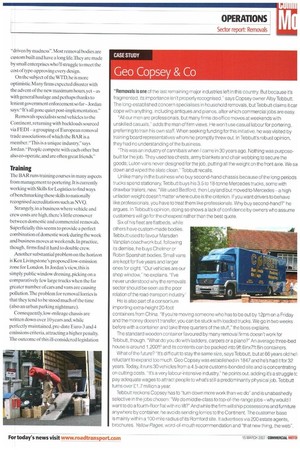Geo Copsey & Co
Page 49

If you've noticed an error in this article please click here to report it so we can fix it.
"Removals is one of the last remaining major industries left in this country. But because its fragmented, its importance isn't properly recognised," says Copsey owner Al by Tebbutt. The long-established concern specialises in household removals, but Tebbutt claims it car cope with anything, including antiques and pianos, after which commercial jobs are easy.
"All our men are professionals, but many firms do office moves at weekends with unskilled casuals," adds the man off irm views. He won't use casual labour for portering, preferring to train his own staff. When seeking funding for this initiative, he was visited by training board representatives whom he promptly threw out. In Tebbutt's robust opinion, they had no understanding of the business.
"This was an industry of cannibals when I came in 30 years ago. Nothing was purposebuilt for the job. They used tea chests, army blankets and chair webbing to secure the goods; Luton vans never designed for the job, putting all the weight on the front axle. We sa down and wiped the slate clean," Tebbutt recalls.
Unlike many in the business who buy second-hand chassis because of the long periods trucks spend stationary, Tebbutt buys his 3.5 to 18-tonne Mercedes trucks, some with drawbar trailers, new. "We used Bedford, then Leyland but moved to Mercedesa high unladen weight doesn't matter where cube is the criterion. If you want drivers to behave like professionals, you have to treat them like professionals. Why buy second-hand?" he argues. In Tebbutt's opinion, doing so shows a lack of confidence by owners who assume customers will go for the cheapest rather than the best quote.
Six of his fleet are flatbeds, while others have custom-made bodies. Tebbutt used to favour Marsden Vanplan coachwork but, following its demise, he buys Chelmer or Robin Sparshatt bodies. Small vans are kept for f ive years and larger ones for eight. "Our vehicles are our shop window," he explains. "I've never understood why the removals sector should be seen as the poor relation of the road-transport industry.'
He is also part of a consortium importing extra-height 20-foot containers from China. "If you're moving someone who has to be out by 12pm on a Friday and the money doesn't transfer, you can be stuck with loaded trucks. We go in two weeks before with a container and take three quarters of the stuff," the boss explains.
The standard wooden container favoured by many removal firms doesn't work for Tebbutt, though. "What do you do with ladders, carpets or a piano?" An average three-bed house is around 1,200ft3and its contents can be packed into 9ft 6inx7ft Sin containers.
What of the future? "It's difficult to stay the same size, says Tebbutt, but at 66 years old he'; reluctant to expand too much. Geo Copsey was established in 1847 and he's had it for 32 years. Today, it runs 30 vehicles from a 4.5-acre customs-bonded site and is concentrating on cutting costs. "It's a very labour-intensive industry," he points out, adding it's a struggle tc pay adequate wages to attract people to what's still a predominantly physical job. Tebbutt turns over £1.7 million a year.
Tebbutt reckons Copsey has to "turn down more work than we do" and is unabashedly selective in the jobs chosen: We do middle-class to top-of-the-range jobs-why would I want to do a fourth-floor flat with no lift?" And while the firm will ship possessions and furniture anywhere by container, he avoids sending lorries to the Continent. The customer base is mainly within a 100-mile radius of its Romford site. It advertises via 200 estate agents, brochures, Yellow Pages, word-of-mouth recommendation and "that new thing, the web".


























































































































































































